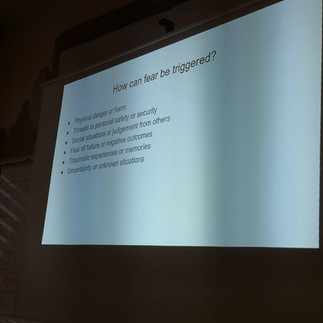“Critical Media Consumption’’, PDA, Szeged, Hungary/13-21 of March 2023
- nicckolas44
- Nov 29, 2022
- 5 min read
Updated: Apr 21, 2023
Project Name: Critical Media Consumption
Activity: Professional Development activity in Hungary for 3 youth workers of our organisation and participants from Hungary, Serbia, Romania, Slovakia, Poland, North Macedonia, Spain, Cyprus, Italy, Greece, and Portugal.
Accomodation: Szeged, Hungary
Dates of the Activity: 13-21 March, 2023 including travel days
Follow Up from our participants
The project was funded by the Erasmus+ Programme of the European Union, coordinated by Innonet n.o. & implemented by Eurotender Association. Eurotender Association INNONET n.o. ACPELIA CYPRUS.
Usually after every Eramsus+ project, the participants need to share their experience and disseminate the knowledge they took during the training. Critical Media Consumption is a training course aimed to improve the media literacy and critical thinking skills of the participants. It was implemented between the 13-21/03/2023 in Szeged, Hungary.
During the first day, we got to know each other by sharing some facts about ourselves and also doing some ice breakers to create a friendly atmosphere. Then we proceeded by setting some ground rules for the project ahead, such as respecting each other, being on time, leaving the work room clean, etc. We also talked about some key concepts concerning media, such as media literacy, media activism, etc.
On the second day, we dived into authorship - who is the person behind a message you see on the media, what are they trying to convey with that message, do they have an ultimate purpose such as convincing you about a certain idea? All these are stuff to consider when consuming media, as many times we do it unconsciously, maybe because something is on the TV or when mindlessly scrolling through our social media feeds.
On the third day of the project, we were introduced to the concept of propaganda, which is a form of persuasive communication that uses techniques in order to promote a specific message or idea. Propaganda's main goal is to influence the perceptions, beliefs and attitudes of the desired target audience. Some of the most common techniques that are used in propaganda are: emotional appeal, testimonials, fear tactics and other.
On the fourth day of the training, we discussed about critical thinking when consuming media and thought of ways to implement our critical thinking skills, such as reviewing multiple sources of information, checking the background of the author, be aware of clickbaits, etc. Then, we were called to walk around the city of Szeged, and take photos of couple of street advertisements we saw, which later we analysed. We were also called to create our own advertisements, in whatever shape or form we wanted, as in video or photo with text, that used the elements we previously discussed about.
On the fifth day, we dived more deeply into the concept of fear, where we had an open discussion about that. We started off by the theory of fear, followed by the triggers of it, such as threats, physical, emotional violence, fear of failure, traumatic experiences, and uncertainty. Then we talked about how fear is manifested, as in physical or emotional symptoms, and lastly, how we can respond to it.
On the sixth day, we were introduced to the concept of logical fallacies: deceptive or false arguments, used to make an argument seem more solid than it actually is, but ultimately proven wrong with further examination and reasoning. Personally, that was one of my favourite activities as we were divided into groups, and had to all work together in order to match the right statement with the logical fallacy it represented. Moreover, on that day, we did a mind map which is a diagram with a main concept in the centre and associated ideas around it, and also a word cloud, which is a visual representation of words in different sizes, indicating their relevance and frequency of use.
On the last day, it was time to put our acquired knowledge about critical media consumption into practice and develop tools that could be used by other youth workers and people engaged in the field of media. Again, we were divided into groups, one group was responsible to develop a brochure with information about media consumption, the other group developed workshop ideas, and the last group created videos, for both adults and kids. All links can be seen below.
The project wouldn’t be complete without an intercultural night, where people from each country prepared some of their traditional and delicious foods/drinks to share with the rest of the participants. All in all the training course was really educational, practical, and also fun!
Video of the project: https://youtu.be/yR7OtGpHDfo
Educational video for young adults: https://youtu.be/NPlAxyHm6tg
Educational video for kids: https://youtu.be/9H2k2gbwy7w
E-booklet for young people about Critical Media Consumption: bit.ly/3zSxeZF
Workshop ideas for youth workers on the topic: bit.ly/3GFpsWB

Travelling food and accommodation all are paid from the program (For an application you must be member of our organization, if you want to apply for membership you can go for the application to the link: https://www.acpelia.org/be-a-member
2 Youthworkers /Teachers /Trainers will be selected from our organisation.

For the participants’ selection the following criteria will be taken into consideration:
wish to develop professionally and personally;
over 18,
willing to be an active participant for the entire duration of the course;
motivated, open-minded, willing to cooperate and share from experience;
possession of knowledge, experience and tools from previous work or projects about media literacy with youth.
open for reflect on their experiences in youth work related to the topic;
desire to explore new ideas and promote media literacy among youth;
motivation and capacity to disseminate the project result.
speak (or open to try to speak) in English.
Main Idea of the Project
All over Europe, young people are spending more and more time online, thus the
consumption of media is increasing accordingly. However, many people are proving to be
ill-equipped with skills to filter out and sort this growing intake of information, making a
promising opportunity ineffective, and sometimes even harmful. This is why there is an
ever so great need for competences allowing young people to navigate themselves around the wild waters of the Internet and media, recognise content of value, and distinguish fake news.
Even so, such media-literacy skills are generally not taught in public schools, that is why the aim of the project is to enable youth workers with tools to educate young people they work with to become more conscious users of the Internet and consumers of media. We strive to provide the participants with useful techniques – within the framework of non-formal education – to promote and enhance critical thinking, and to raise awareness of media-literacy.
Throughout the project, we will implement workshops, individual- and group exercises to
help youth workers gain experience themselves in the field of focus, thus enabling them
to improve the media-literacy and critical thinking skills of the youth.

The training will take place in Szeged, Hungary. The city is located in the Southern Great-Plains region in Hungary, it takes 2 hours by train to get to from the Airport of Budapest.
Accomodation
The accommodation for the participants will be in gender based rooms with 2-3-4 separated beds and bathrooms, located at a comfortable walking distance from the city centre. The meeting room where most of the activities will take place will be right in the hotel.

Relevance of the project for Erasmus + :
● Raising emotional awareness and empathy.
● Empowering young people with skills and confidence to become agents of change in their communities.
● Enabling young people to be valued and treated with respect.
● Enhanced teamwork and cooperation.
● Including PAXs with fewer opportunities.
● Improving all of Erasmus Plus key competences and skills for young people.

Application for Interest of Participation: https://forms.gle/xxz23dyLCnMqJLxt8
If you want to be a candidate of our program please complete the application form and don't forget to complete the membership form if you are not a member of our organisation. Link for completing the application of membership: https://www.acpelia.org/be-a-member






































Comments